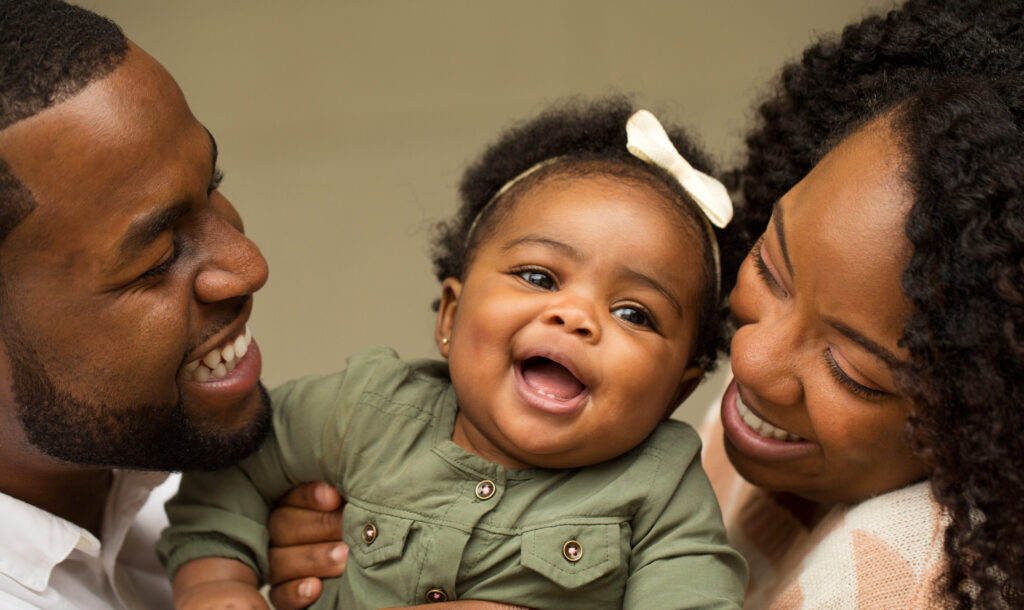By Dayna Long, MD
Nurture Connection believes in equitable access to the support and resources all caregivers need to form healthy relationships with their children from birth. This requires a significant shift in the way practitioners who work with young children and families think and respond. It requires them to recognize the structural, historical, and racist barriers families face alongside the cultures, traditions, and generational history that are sources of strength for building strong, positive, and nurturing connections with their babies.
BLOOM: Black Baby Equity Clinic is an inspiring example of how a clinic is centering the Black family experience in Early Relational Health (ERH). BLOOM is an initiative of the UCSF Benioff Children’s Hospital Oakland, cofounded by Dayna Long, MD, and Javay Ross, MD, pediatricians at UCSF Benioff Children’s Hospital Oakland’s Primary Care Clinic. Dr. Long, a renowned early childhood and Adverse Childhood Experiences (ACEs) researcher and practitioner, is a member of Nurture Connection’s National ERH Network.
Part of what makes BLOOM unique is the understanding that a sense of belonging is critical to a child’s and family’s social and emotional health. While we don’t often hear the terms “belonging” or “love” in pediatric settings, that is BLOOM’s special ingredient for addressing our country’s long-standing health inequities.
As stated in UCSF’s press release for BLOOM, “This clinic is for Black families who feel unseen and unheard, and feel their concerns about their baby’s care are being dismissed. Here Black parents will know they are valued and their babies are loved.”
The goal of the clinic is to transform the pediatric experience for Black families. Care teams ensure families feel understood, their concerns are being heard, and they have the support they need to experience positive emotional connections with their babies.
This is essential work to improve the health of Black babies. According to the California Department of Public Health, in the San Francisco Bay Area, Black babies are two to three times more likely to be born prematurely or die in their first year, compared with white babies. Across the country, statistics show that Black women are two to three times more likely than white women to die during pregnancy, labor, and within a year of childbirth.
Although multiple factors are at work, a growing body of evidence is revealing how chronic exposure to racism, implicit bias, and disrespect during healthcare visits contribute to disparate health outcomes. For example, a statewide California survey reveals that Black women report difficulty in communicating with their providers and have a lack of practical and emotional postpartum support.
At BLOOM, Black families with children 0–3 are seen by a Black pediatrician. Everyone on the clinical team, including social workers, lactation specialists, therapists, and health educators, participate in trauma-informed care and cultural humility training to understand the social, cultural, and racial challenges many Black families experience. Recognizing both the unique and shared traumas and joys of the Black experience in a clinical setting, BLOOM prioritizes healing-centered care.
BLOOM’s multidisciplinary teams meet weekly with families to address their concerns and ask how they are doing with breast-feeding, sleep, and other relevant topics as well as to connect families with community resources. Most importantly, families talk with their health teams about the joy they experience when interacting with their babies, which is foundational for the emergence of ERH.
As one BLOOM patient explained, “Dr. Long makes me feel safe as a parent. I trusted her instantly because she understands my story and has the courage and freedom to adjust her care to my baby’s needs. I don’t have to do unnecessary explaining — she just gets it.”
The clinic’s approach of supporting ERH through provider-patient racial concordance, or connecting families with pediatricians of the same race, is linked to more effective therapeutic relationships, higher patient satisfaction, and improved healthcare. However, increasing the diversity of medical teams will continue to be challenging; although 13% of people in the U.S. are Black, just 4% of U.S. doctors and 7% of medical students are Black.
When we are brave enough to center equity in organizational design and intention, work together with families to promote ERH, and provide the culturally relevant resources they need, we can create trust, belonging, and improved health. To find out more about the BLOOM: Black Baby Equity Clinic, contact Lorna Fernandes.
Dayna Long, MD, is a pediatrician with special interests in community health and engagement, and in promoting equity in healthcare. Her goal is to enable every child to be as healthy as possible by eliminating the inequities that lead to poor health outcomes for many families and young children. Dr. Long earned her medical degree from the George Washington University School of Medicine and Health Sciences.
